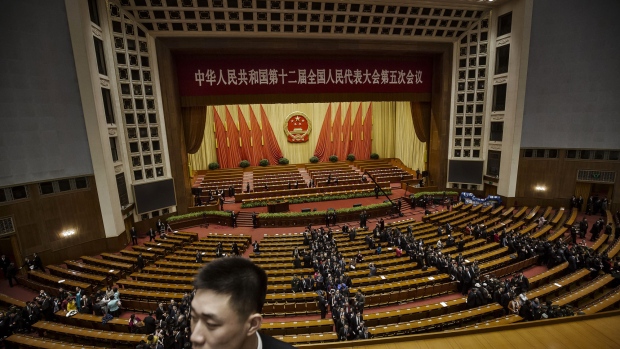Feb 18, 2019
What to Watch at China's Biggest Meeting of the Year
, Bloomberg News

(Bloomberg) -- Some 3,000 of the most powerful officials in China are preparing for the annual parliamentary pageantry known as the National People’s Congress. Although it’s China’s main legislature, the ruling Communist Party ensures that important decisions are made long before any proposals reach the floor. Still, the public proceedings over 10 days in Beijing offer a rare chance for thousands of journalists from around the world to hear from and interact with the people involved in running the world’s second-largest economy.
1. Who’s coming?
This year’s NPC, which opens March 5, includes local and national party chiefs, government officials, company executives, provincial deputies and military commanders. Everyone needs the party’s blessing to attend, from so-called model workers to tech billionaires. Chinese leader Xi Jinping and all the other members of the Politburo Standing Committee are also NPC deputies. The NPC runs concurrently with a gathering of China’s top political advisory body, the Chinese People’s Political Consultative Conference. Together they’re commonly known as lianghui, or the “two sessions.” The guest list of individual attendees to the NPC and CPPCC has yet to be announced. But it should look similar to last year’s, when Baidu Inc. CEO Robin Li and Tencent Holdings Ltd. CEO Pony Ma were two of the biggest names.
2. What’s it for?
The party uses the NPC to announce major policy changes and personnel reshuffles, like Xi’s 2018 decision to scrap term limits, which paved the way for him to rule indefinitely. But it’s mostly a rubber stamp parliament, largely serving to ratify decisions handed down from other state bodies. Research from Harvard University’s Ash Center for Democratic Governance and Innovation called it “a ceremonial legislature.”
3. What’s facing Xi going in?
The greatest confluence of political threats during his six years in power. The trade dispute with Donald Trump’s administration could lead to fresh tariffs on hundreds of billions of dollars’ worth of Chinese goods if a deal isn’t reached. A crackdown on minority Muslim Uighurs in the far western region of Xinjiang is drawing international condemnation of China’s human rights record. And the party worries about how China’s 1.4 billion citizens will behave on the 30th anniversary in June of the bloody crackdown on Tiananmen Square. Xi was concerned enough to summon top officials to Beijing in January for a stark, rare warning that “major risks” abound and their “long-term rule” wasn’t guaranteed.
4. What’s this year’s big issue?
The economy. Chinese Premier Li Keqiang will deliver overall growth targets and Finance Minister Liu Kun and officials from the People’s Bank of China are also expected to address the delegates. China’s slowdown has begun hitting home, with provinces slashing their growth targets as the trade war fuels its weakest growth since 1990. Xi’s government plans to set a target range for national economic growth of 6 to 6.5 percent for 2019, Reuters has reported -- a possible sign that policy makers are embedding the slowdown into their goals for this year.
5. Anything else?
The legislature is also scheduled to review a draft law protecting the intellectual property of foreign investors and banning forced technology transfers -- two of Washington’s key demands in its trade fight with Beijing. And there are regular briefings and comments from party officials who run key regulatory bodies -- and provinces with bigger economies than many countries in the world.
- QuickTakes on China’s slowdown, intellectual property dispute and tensions at sea with the U.S.
- A SupChina roundup of what happens at the “Two Sessions.”
- China’s point of view on the NPC’s function, via its official website.
- Victims of China’s family planning policies talk to Bloomberg.
- We spent 10 days at the heart of Xi’s Muslim crackdown.
--With assistance from Dandan Li and David Ramli.
To contact the reporter on this story: Karen Leigh in Hong Kong at kleigh4@bloomberg.net
To contact the editors responsible for this story: Brendan Scott at bscott66@bloomberg.net, Karen Leigh, Paul Geitner
©2019 Bloomberg L.P.


